A most participative concert
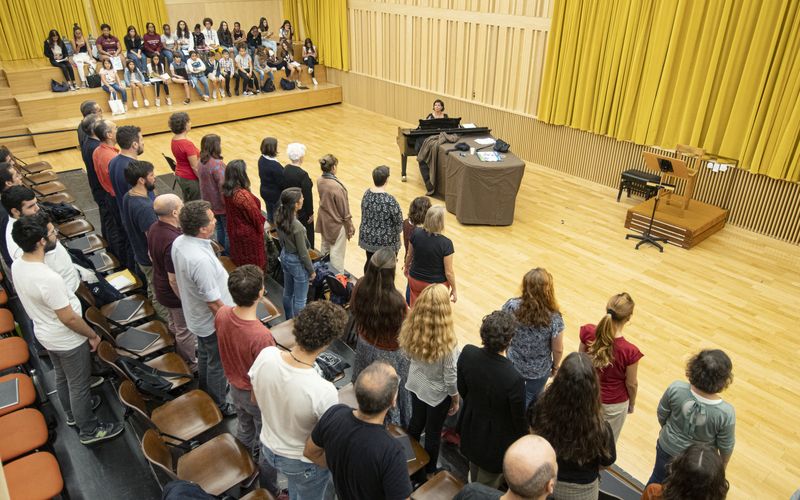
Originally written for singers, musicians and dancers, the Mass resulted from a commission by Jacqueline Onassis for the inauguration of the Kennedy Center for the Performing Arts in Washington in 1971. Just like the music Bernstein composed for the West Side Story play that premiered in Broadway in 1957 and was later adapted to cinema, this work also surprises for the extraordinary variation in its musical language that interweaves folk, gospel, Broadway and the romantic tradition with facets of the 1960s vanguard.
The production the Gulbenkian Música is now presenting – for the first time in its history – is directed by Clark Rundell and with stage design by Marie Mignot. They are joined by the baritone Jubilant Sykes, the Gulbenkian Choir and Orchestra, the Participative Choir, two Children’s Choirs (Gregorian Institute of Lisbon and Casa Pia), the Orquestra Geração and musicians from the Luiz Villas-Boas/Hot Clube de Portugal Jazz School.
A day of rehearsals
On an October Saturday, we accompanied the rehearsal of the 60 amateur singers that make up the Participative Choir and that provide strength and depth to the Gulbenkian Choir in this concert. After having sung Mozart’s Requiem last year, this time the challenge looms still larger with the choice of this far less well-known 20th century work. As the choir singers began arriving and taking up their places in the rehearsal room, the children’s choirs had already notched up an hour of work under the maestro Filipa Palhares.
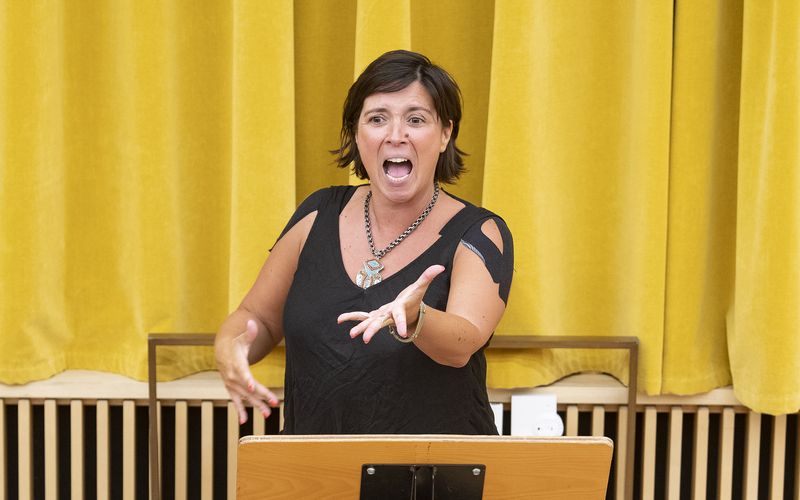
They were now all going to rehearse together for a short period – something that was not originally planned for but was to the agreement everybody involved. “Right, let’s get started as the children have to leave at 3.30pm”, the maestro warned, hurrying the work up after the initial warm-up period. “Open your scores on page 182.” You will find there the Offertory, a section sung in Latin. “Exspectat, anima mea Dominum…” they begin under the close watch of the maestro, who alternates between working as a collective and each individual group. “Do the tenors really want an invitation by writing, by pigeon mail or perhaps some smoke signals?”, the maestro ironically inquired given the lower level of determination shown at the beginning of the phrase. “Now, energy now!” Attentive to the progress in the sounds, Filipa Palhares goes about detecting and correcting certain shortcomings: “There are some notes wrong here. Let’s do it again.” And the choir follows her, keeping pace along the sometimes complex paths through the score, repeating some phrases time after time. “By November, we’ll get it done”, the maestro promises. “Are the boys ready to come in afterwards?” The Lisbon children’s choirs of the Gregorian Institute and Casa Pia step up with surprising aplomb. “Now, everybody without the score”, the maestro challenges. “Who didn’t take their pills for their Alzheimer’s?” This is the scenic component that this mass demands; that they all memorise the score and the repetitions continue until hearing the most sought-after comment from the maestro: “Aaaah, very good, now that’s already another story! Don’t you feel the difference?”
And that has been the routine ever since the second weekend of September: amateur singers of various ages, professions and with an equal variety in their motivations, come together for an experience they all feel is unique, that is, performing on the stage of the Grand Auditorium with the Gulbenkian Choir and Orchestra.
Singing in family
Among these participants, there is an entire family: mother, father and their two children and each interestingly belonging to a different vocal group. José Paulo, tenor, aged 54 is a mathematics teacher; Isabel, soprano, aged 49, is a descriptive geometry teacher; Sofia, contralto, aged 21 and, after graduating in musical science, is taking her master’s degree; Guilherme, baritone, has just turned 18 and is studying sports science. They live in Sintra and are participating in the Gulbenkian Music Participative Concert for the second time. Speaking for the family, Isabel said that they decided to risk it after having sung in Mozart’s Requiem last year. To risk it? “Yes, because this is a completely different piece and for us it has been challenging to leave behind a more classical tone.”
For this family, the enjoyment of music began early on. Their parents attended local music schools and the parish choirs and their children grew up in this musical ambience: “From them being very young, we had instruments available there at home, a piano, organ, accordion, violin, flutes, percussion, which were always getting played in a self-taught fashion.” This experience has guaranteed that they wish to continue participating in future Participative Concert performances.
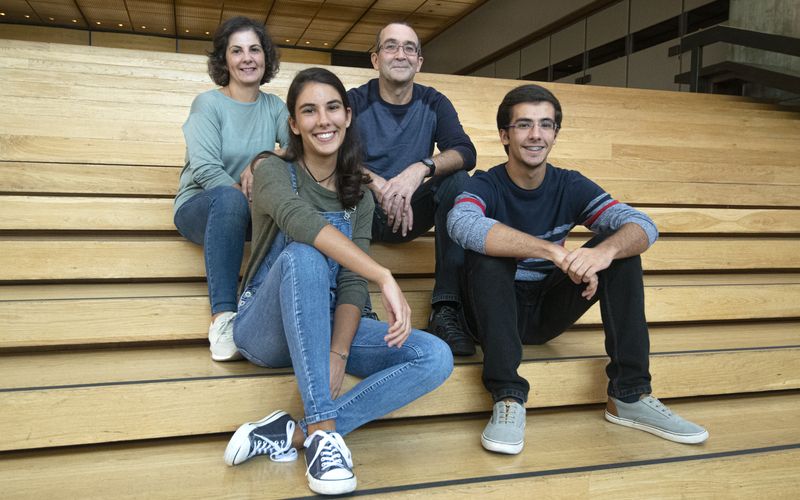
Getting into the spirit of the piece and giving your best
Nuno Gonçalves Pereira is a tenor and holds a management position at the Lisbon Metropolitan company and is also a member of the Polyphonia Choir. He has not missed any of the Participative Concerts since 2014. On rehearsal day, he was turning 54 but that did not put him off from joining his colleagues for another afternoon of practice. “This Mass is a very different piece; the weighting of the rehearsal timetable is more demanding and there is an additional component of choreography. Hence, we have to know the score by heart.” But, at the same time: “This is an activity that stimulates me, completes me and helps in balancing my professional life. Here, I forget any problems and singing helps me be better in my life; both in the family and professionally.” As regards the rehearsals, he stated that “building a performance is as good as presenting it because all the work that goes in really is participative”. As regards this piece, which he did not know before, he declared at the beginning “it seems strange but then it entwines you”. He spent the summer listening to it, getting into its spirit: “It’s important to understand the historical context of that time and that the composer sought to convey. I think he managed to do so and now I shall give my own very best.”
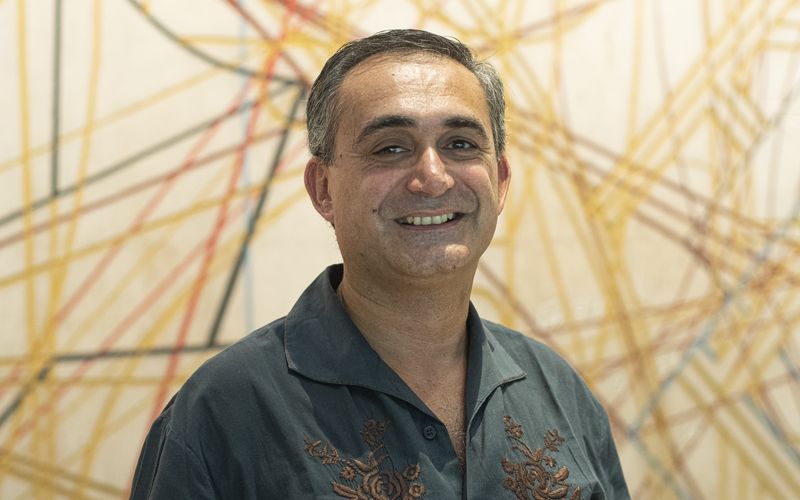
Moving from project to project
Rita Vieira, contralto, is aged 48 and is an interior designer and enrolled in a Gulbenkian Music Participative Concert for the first time this year despite having appeared on other stages in similar experiences. “One performance drives another”, he told us revealing that he had just been selected for another participative project for the Christmas season and also plans on starting another in January. He accepts he would not know what to do without this dynamic: “There is no end, this really is a type of addiction, something that gets right under your skin.” This intense activity is maintained in conjunction with the rehearsals and performances of a choir he joined three years ago, the Menor Choir: “This is an amateur choir, very eclectic and that has received various invitations to participate in various different projects.” About Bernstein’s Mass, which he did not previously know, it was the extreme variation in the piece that most surprised him. “The more deeply that I came to know the piece, the more I began to enjoy it. At this moment, I may say that I simply adore the work.”
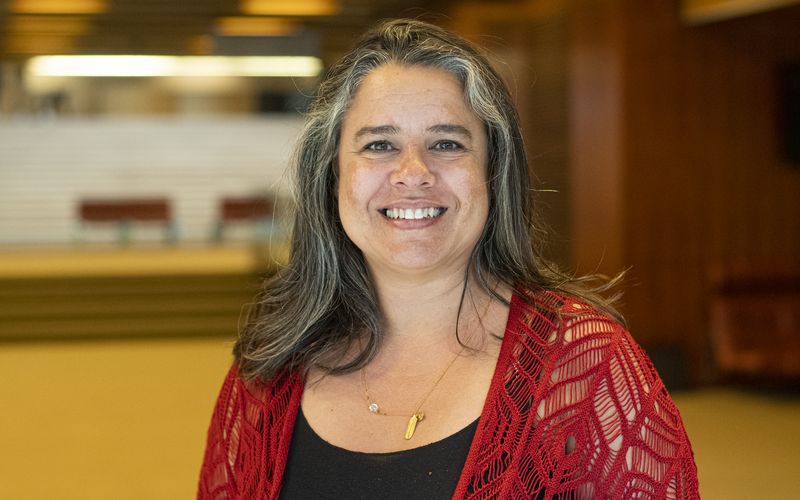
Bernstein’s Mass
Participatory Concerts
Main Building – Grand Auditorium
Sat, 30 Nov / 19:00 – 21:00
Sun, 1 Dec / 18:00 – 20:00
